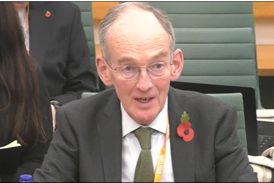Decisions filed recently with the Law Society (which may be subject to appeal)
Gary Jonathan Glover
Application 12361-2022
Admitted 2002
Hearing 6 October 2022
Reasons 13 October 2022
The SDT ordered that the respondent should pay a fine of £4,000.
While working as a solicitor and manager at Garner Canning Ltd, the respondent had, following a complaint submitted on behalf of clients C and D, failed to provide a prompt response thereby failing to achieve outcome 1.11 of the SRA Code of Conduct 2011, and breaching principles 4 and 5 of the SRA Principles 2011.
He had failed to cooperate fully with the legal ombudsman, in that he failed to comply with the following requests or failed to provide an explanation for non-compliance: (i) a request for a response in relation to a complaint from client G; (ii) a further request for a response in relation to a complaint from client G; (iii) a request for payment in relation to the complaint submitted on behalf of clients C and D; (iv) a further request for payment in relation to the complaint submitted on behalf of clients C and D; (v) a request for a response in relation to a complaint from client A; and (vi) a further request for a response in relation to a complaint from client A; thereby failing to achieve outcome 10.6 of the 2011 code, and breaching principles 6 and 7 of the 2011 Principles, and breaching paragraph 7.3 of the SRA Code of Conduct for Solicitors, RELs and RFLs 2019, and principle 2 of the SRA Principles 2019.
The parties had invited the SDT to deal with the allegations against the respondent in accordance with a statement of agreed facts and outcome.
The respondent had failed to deal with complaints as he should have done.
The further, repeated, failures to cooperate with the legal ombudsman had risked bringing the profession into disrepute and undermining public confidence.
The respondent was not the source of the various complaints and had resolved various other complaints on behalf of the firm. Full and very prompt admissions had been made.
In all the circumstances, the proposed fine of £4,000 was appropriate and proportionate, and the application for matters to be resolved by way of the agreed outcome was accordingly granted.
The respondent was ordered to pay costs of £10,000.
Virinder Kumar Ghaiwal and Ian Mclachlan (1)
Application 12254-2021
Hearing 28 January 2022
Reasons 8 February 2022
The SDT ordered that the first respondent (admitted 1999) should pay a fine of £6,000.
When in practice as a solicitor at GQS Limited, the first respondent, while acting as the certificate provider in respect of A’s two lasting powers of attorney, had failed to meet his obligations as certificate provider, in that he had failed to verify instructions from A; and had failed to ensure that A understood the purpose of the LPAs and the scope of the authority they provided, thereby breaching principle 6 of the SRA Principles 2011.
The parties had invited the SDT to deal with the allegations against the first respondent in accordance with an agreed outcome proposal.
The SDT had reviewed all the material before it and was satisfied on the balance of probabilities that the first respondent’s admissions had been properly made.
The first respondent was wholly responsible for his misconduct, notwithstanding that it had occurred in an area that was outside his usual area of practice.
The admitted misconduct was too serious for sanctions such as no order or a reprimand. A financial penalty of £6,000 appropriately reflected the seriousness of the misconduct.
The respondent was ordered to pay costs of £11,000.
Virinder Kumar Ghaiwal and Ian Mclachlan (2)
Application 12254-2021
Hearing 31 January 2022
Reasons 16 February 2022
The SDT ordered that the second respondent (admitted 1972) should be suspended from practice for 12 months from 31 January 2022.
While in practice as a solicitor at GQS Limited the second respondent had failed to handle the sale of A’s property in a manner which protected A’s interests, in that he had failed to advise A of, or ensure that A understood, the risks and implications of selling his property in exchange for, in part, non-monetary items, namely a diamond ring and a car, and had failed to take or cause to be taken any or any adequate steps to verify the buyer’s valuation of the car and the ring or their title thereto, thereby breaching principles 4, 5, 6 and 10 of the SRA Principles 2011.
He had failed to conduct adequate customer due diligence and ongoing monitoring of the business relationship with client A in relation to the sale of a property, thereby failing to comply with his obligations under regulations 7 and 8 of the Money Laundering Regulations 2007, breaching principles 6 and 7, and failing to achieve outcomes 7.2 and 7.5 of the SRA Code of Conduct 2011.
He had failed to conduct enhanced customer due diligence, thereby failing to comply with his obligations under regulation 14(1)(b) of the 2007 regulations, breaching principles 6 and 7, and failing to achieve outcomes 7.2 and 7.5 of the 2011 code.
He had failed to verify A’s instructions regarding the drafting of A’s will to ensure that A understood the terms of the will and was not under any undue influence, thereby breaching principles 4, 5, 6 and 10, and failing to achieve outcome 1.12 of the 2011 code.
In respect of each of the above his conduct was manifestly incompetent.
The parties had invited the SDT to deal with the allegations against the second respondent in accordance with an agreed outcome proposal.
The SDT was satisfied that an undertaking given by the second respondent that he would remove himself from the roll upon the expiration of the proposed fixed term of suspension, and would never seek readmittance, would provide protection equivalent to the restrictions on practice which it would otherwise have imposed. The breach of such an undertaking would itself amount to very serious misconduct, likely to result in strike-off from the roll.
The application for matters to be resolved by way of the agreed outcome proposal was granted.
The second respondent was ordered to pay costs of £11,000.
Andrew Roy Jameson
Application 12353-2022
Admitted 1992
Hearing 14 September 2022
Reasons 30 September 2022
The SDT ordered that the respondent should be struck off the roll.
The allegations against the respondent were based on his conviction for serious criminal offences. The conviction had resulted in a sentence which included a period of over four years’ imprisonment.
It was alleged that the convictions and the conduct on which they were based amounted to a breach of principles 2 and 5 of the SRA Principles 2019.
The parties had invited the SDT to deal with the allegations against the respondent in accordance with a statement of agreed facts and outcome.
The SDT had reviewed all the material before it and was satisfied on the balance of probabilities that the respondent’s admissions had been properly made.
The respondent had been convicted of offences which had led to a lengthy custodial sentence.
While the offences did not relate to his practice, the SDT had found that public confidence in, and the reputation of, the profession required no lesser sanction than that the respondent be removed from the roll, and that the proposed sanction was appropriate and proportionate.
Having carefully weighed the requirements of open justice against the countervailing factors and risks in the specific circumstances of the case, and having considered the competing article 8 and article 10 ECHR rights, the SDT directed, pursuant to rule 35(9) of the Solicitors (Disciplinary Proceedings) Rules 2019, that nothing beyond the summary above and the public judgment should be published in the case (without permission of the SDT).
In the specific circumstances of the case the SDT considered that any such publication could cause exceptional harm and/or prejudice and that this risk outweighed the principles of open justice.
In any event, the detail of the conviction was not necessary for the profession and public to understand the reason the respondent had been struck-off. He had been convicted of a serious criminal offence and the only appropriate sanction was that his name should be removed from the roll.
The respondent was ordered to pay costs of £1,692.
Brian Sarney
Application 12339-2022
Admitted 1977
Hearing 28 September 2022
Reasons 6 October 2022
The SDT ordered that the respondent should be struck off the roll.
While in practice as the recognised sole practitioner and owner of Roger Dean & Co, by making or allowing to be made improper withdrawals totalling £200,247.86 from two client matters’ ledgers resulting in a shortage on the firm’s client account in that sum the respondent had, up to 25 November 2019, breached principles 2, 6 and 10 of the SRA Principles 2011, and rules 1.2 (a), 1.2(c), 20.1 and 20.3 of the SRA Accounts Rules 2011; and for the period from 25 November 2019, principles 2, 4 and 5, and rule 5.1 of the Accounts Rules. Up to 25 November 2019 the respondent had acted dishonestly.
Between 6 October 2017 and 20 December 2018, by making or causing to be made improper transfers totalling £55,521.50 from the client matter ledger for client C resulting in a shortage on the firm’s client account in that sum, he had breached principles 2, 6 and 10 of the SRA Principles 2011; and rules 1.2(a), 1.2(c), 20.1 and 20.3 of the SRA Accounts Rules 2011. Up to 25 November 2019 the respondent had acted dishonestly.
By causing or allowing a minimum shortage of £232,341.59 as at 31 August 2021 to occur in respect of the firm’s client account he had breached principles 2, 4 and 5 of the principles.
By failing to remedy the minimum cash shortage of £232,341.59 on client account as at 31 August 2021 promptly or at all, he had breached principles 2, 4 and 5 of the principles, and rule 6.1 of the Accounts Rules.
By providing incorrect information to the beneficiaries of the estate of client A which was untrue and misleading and which he knew to be so at the time, he had breached principles 2, 4 and 5 of the principles.
By failing to provide full and accurate information to the residuary beneficiary of estate B he had, for the period up to 25 November 2019, breached principles 2 and 6 of the 2011 principles and, for the period from 25 November 2019, principles 2, 4 and 5 of the principles. Up to 25 November 2019 the respondent had acted dishonestly.
Given the seriousness of the respondent’s repeated dishonest conduct, and that no exceptional circumstances had either been advanced on his behalf or were apparent on the papers, the only sanction which would meet the public interest was one striking the respondent’s name from the roll. The respondent was ordered to pay costs of £22,635.
Jayesh Sasdev
Application 12270-2021
Admitted 1987
Hearing 5-13 September 2022
Reasons 5 October 2022
The SDT ordered that the respondent should be struck off the roll.
While in practice as a partner and solicitor at Archer Fields Solicitors, in relation to his handling of person MA’s estate on behalf of client A, he had charged up to £256,907.96 of costs when such costs were excessive and unjustified, thereby breaching principles 2, 4, 6 and 10 of the SRA Principles 2011. He had acted dishonestly.
He had failed to provide adequate or accurate costs information to client A about the conduct of her matter, thereby breaching principles 2, 5 and 6, failing to achieve outcome 1.13 of the SRA Code of Conduct 2011, and breaching rule 17.2 of the SRA Accounts Rules 2011.
He had failed promptly to wind up the estate of client A’s husband, person MA, thereby breaching principles 4, 5 and 6.
He had failed to deal with the SRA in an open, timely and cooperative manner, by failing, timeously or at all, to provide substantive responses to enquiries by the SRA’s regulatory supervisors and investigation officers, and seeking to prevent client A and her sister, person C, from providing information to the SRA, thereby breaching principles 2, 6 and 7, and failing to achieve outcomes 10.7, 10.8, 10.9 and 10.10 of the code.
He had failed to distribute or otherwise deal with residual client balances (relating to person MA’s firm) totalling £279,807.53, thereby breaching rules 14.3 and 14.4 of the SRA Accounts Rules 2011, and principle 6.
He had failed to obtain and deliver accountant’s reports for 2015/16 and 2016/17 on time, in breach of rule 32A.1 of the SRA Accounts Rules and had failed to provide timeous answers to the SRA’s investigator, in breach of principle 7 of the SRA Principles 2011.
The respondent was motivated by his desire for personal financial gain. He was being pressured by his partner to bring more income into the firm. He had caused immense harm to his client and her sister.
His conduct was aggravated by the SDT’s finding of dishonesty that was deliberate, calculated and repeated. He had targeted his client’s vulnerability, praying on her lack of English and had coerced her into not communicating with the SRA.
No circumstances had been found that were enough to bring the respondent in line with the residual exceptional circumstances category referred to in the case of Sharma.
The only appropriate and proportionate sanction was to strike the respondent’s name from the roll. The respondent was ordered to pay costs of £69,233.






























